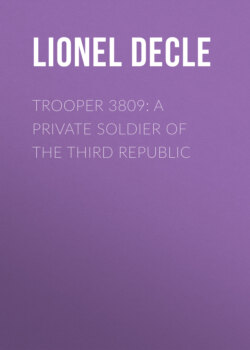Читать книгу Trooper 3809: A Private Soldier of the Third Republic - Lionel Decle - Страница 7
На сайте Литреса книга снята с продажи.
II
ОглавлениеTable of Contents
The military law I have just explained is that which has been in force since 1889 only. It differs from the previous law chiefly in regard to the length of service. In my time (1879) the period of service in the active army was five years instead of three. Young men, however, who had obtained the degrees of B.A. or B.S., provided they paid £60 to Government, and provided also they contracted a voluntary engagement within the year preceding that in which they became liable to conscription, were allowed to serve only one year instead of five. During the next four years they still belonged, however, to the active army, and were liable to be called at any time by decree of the War Minister. These young men were officially called Engagés conditionnels, but commonly termed Volontaires d'un an, or by abbreviation Volontaires. It was as such that I served.
I have roughed it a good deal since those days, but I have no hesitation in saying that the time of my active service with the colours was the bitterest experience I ever underwent.
In the case of a nation which possesses no public schools like the great institutions of England, I believe that compulsory military service might be made an excellent moral and physical training for young men in every rank of life. But the French system is vicious. A system in which gentlemen of refinement and the vilest dregs of the city slums are subjected to identical treatment, and ruled by identical measures of discipline, is an impossible one. Take punishments, for instance. "Equality of punishment" may sound well in theory, but in practice it becomes the rankest inequality. A gentleman accustomed to comfort, or perhaps luxury, is for the slightest fault sent to the Salle de Police to endure the degrading horrors presently to be described—his companions are perhaps roughs who have never slept in a bed since they were children, to whom dirt is a mere necessary condition, and vermin are "familiar beasts."
Where is the equality of punishment in such a case?
It must not be thought either that some compensation lies in the comparative infrequency of the punishments meted out to gentlemen. The contrary is the truth. For an equal fault the rough usually gets a shorter punishment than the man of higher class.
The German system is very different. In Germany they also have the reduced service of one year for young men who have fulfilled certain conditions of superior education. But these ein jahr preiviller, as they are called, form a class absolutely distinct from the other privates, and are distinguished by a uniform of better cloth. During the first month of their service they live in barracks, where they learn the routine of a common soldier's duties, but afterwards they are allowed lodgings in the town where their regiment is quartered, and they are altogether treated differently from the rest.
Then, again, in the German army non-commissioned officers cannot punish a private, the Captain alone having the right of punishment, while in the French army a Corporal could give us two days' Salle de Police; a Sergeant, four; a Sergeant-major, a Sub-lieutenant, or a Lieutenant, eight; and a Captain could send us to prison. Each of those punishments was usually increased by the Major, and also by the Colonel, and it will scarcely be credited that no man could appeal against a punishment until he had undergone the whole of it. Things have altered a little since General Boulanger was Minister of War, but very slightly. There is still no higher appeal than to the Colonel, and such a thing as a private or even an officer having the right to ask for a court-martial in case he considers himself unjustly punished does not exist. But more of this in the sequel.
